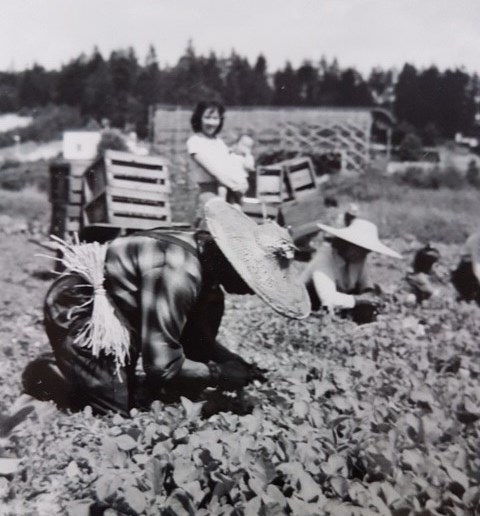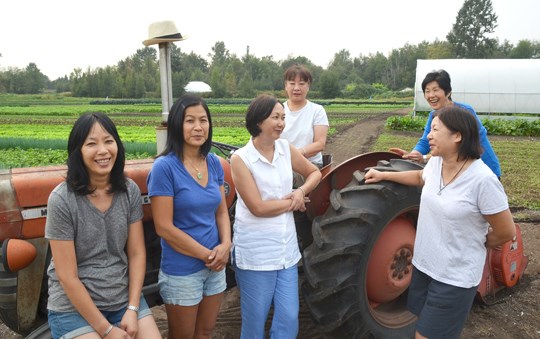It’s a quiet choreography of chaos as the Hong family criss-crosses the property below Marine Drive on a sunny late summer afternoon. Some carry crops back and forth between buildings. Others are busy in the bustling retail outlet. One wears rubber boots and wields a hose as she cleans produce.
It’s a day like countless others during the last few decades at Hop On Farms, which has been a familiar landmark and go-to place for fresh produce in South Burnaby for decades.
They know the roles. They ought to. All six Hong sisters have done everything on the farm at one time or another ever since they were too big for a stroller. And now, some of their offspring and grandchildren can be found on the farm, as evidenced by one corner cluttered with kids bikes.
How they got there is one of the tales that will be told at Chinese-Canadian Stories at the Bob Prittie Metrotown branch of the Burnaby Public Library on Oct. 4. The event is part of the Burnaby Neighbourhood Histories Series that honours its 125-year history.

Grandfather Gay Tim Hong came to Canada in 1925, working as a houseboy and other jobs. He took the money he made back to China every few years so the family could “purchase more land and build a grand home in our small village,” according to Chan Kow Hong, their father, in a reminiscence his family has saved. Chan Kow’s grandmother, mother, two sisters, his wife and oldest daughter, Pauline, all lived in the home.
When the Communist party took over in 1949, the government confiscated the family’s property. Chan Kow’s wife and mother were jailed as landlords. Gay Tim Hong had to continue sending money back to China to make the payments the government demanded for their release. Once they got out, Chan Kow’s wife and Pauline went to Hong Kong.
Chan Kow arrived in Canada in 1952 when he was 21 to join his father, who was leasing farmland on the Musqueum Indian Reserve in Vancouver. But they wanted to own their own operation. In December 1953, Chan Kow and three others bought the property on Marine Drive between Gilley and Royal Oak avenues. They named it Hop On Farms because in Chinese it meant peaceful partnership or union.
Chan Kow’s wife and Pauline finally arrived in 1958. Eventually, they had five more daughters and one son, Gary, who now lives in Comox on Vancouver Island. By 1964, Chan Kow and Gay Tim bought out the other partners.
They worked hard, long hours. They had to because there was lots of competition from the other Chinese farms on The Flats.
“They never got dinner until 10 or 11 at night,” says Pauline. “Even when the kids went to school they didn’t get dinner until 11. We had to help wash the radishes, pack it up into wooden crates and then load it up onto the truck. No machinery. It was all hand powered. There were no forklifts.”
Pauline, Josephine, Catherine, Norine, Gary and twins Darlene and Marlene went to primary grades (one to three) across the street at Glenwood Elementary before moving up the hill to Clinton for grades four to seven. Then it was up the hill to McPherson Park Junior High at MacPherson Avenue and Rumble Street, and Burnaby South Senior High on Kingsway.
“We kept very much to ourselves. I don’t think we went out. We kept basically as a family. We didn’t integrate into (society). We didn’t have time,” says Pauline.
She laughs a bit uncomfortably when asked about racism in those days. “We still got called chinks in school. It would probably be racist now. I could probably sue somebody now.”
“We didn’t even know what racism was,” says Josephine. “We just knew you didn’t belong really. And although we had lots of friends, we couldn’t participate in their activities. They went to Sunday school or to church and we didn’t do things like that because we had no time, we had to work. We didn’t really participate in a lot of things they’d do. They
went away for the summer, and we had to work all summer. They would have birthday parties and we didn’t know what a birthday party was.”
Their father liked to cook, so when his father retired, Chan Kow decided to get out of farming and open a restaurant in Kamloops, the Lotus Inn, with his dad in 1972.
“They noticed there were no Chinese restaurants there so that was their dream, to go up there,” says Pauline, who took over the farm with her husband, Jack Chan. “We’re doing OK. We diversified.”
Every year is a challenge, and often dependent on the weather. They elevated the operation by introducing a seasonal retail component. They also switched crops around to improve production. Celery, for instance, took the whole summer to grow while other veggies have a shorter growth period. Celery is also a thirsty and hungry vegetable that guzzles water and gobbles up nutrients. Then there’s cauliflower that takes up a lot of space.
“All the weeding that goes around it, it’s not worth it anymore,” says Josephine.
So they switched to crops with faster turnover like radishes, carrots, green onions, herbs and kale. To keep the operation viable year-round, they grow bedding plants in their many greenhouses.
The Hongs don’t believe recent immigrants realize what the pioneer Chinese endured to make a life in Canada.
“I don’t think they care. I really don’t think they care. They’re so rich and they feel they can do anything they want,” says Pauline. “We had to start from scratch, and really from scratch.”
Although they’ve made a go of it in Burnaby, the Hong sisters don’t want their kids to endure the heavy labour they’ve had to do all their lives.
Like their ancestral pioneers, they want something better for their descendants. But, they ask, “Who’s going to do the work?”



